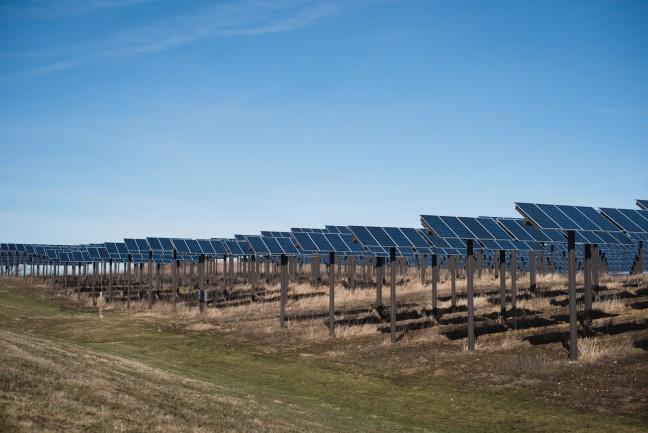RENEW Wisconsin launched the “EVs for Good” initiative in early April, a new program that provides nonprofit organizations with financial support for purchasing electric vehicles.
This new grant program aims to promote electric vehicles to nonprofits located in Wisconsin and continue the organization’s effort in shifting Wisconsin vehicles’ power sources from fossil fuels to renewable energy, according to RENEW Wisconsin.
RENEW Wisconsin is dedicated to the promotion of renewable energy as a mission-based organization in Wisconsin. According to its website, RENEW Wisconsin introduces and implements programs with focuses on bioenergy, electric vehicles, geothermal, hydropower, solar energy and wind energy.
Nonprofits that buy a new or used electric vehicle can be granted 20% of the cost with a maximum amount of $5,000, according to the organization’s website.
$6.2 million in grant money will be distributed to help vaccine equity, access in Wisconsin
The purchase of an electric bicycle by nonprofits can be eligible for a grant as well. If nonprofits want to purchase an electric van or bus that can carry eight or more people, a maximum of $10,000 can be made available. The organization also offers nonprofits that install an electric vehicle charger a $500 grant, according to its website.
According to the organization, to be eligible for the grant, nonprofits should be registered organizations allowed to take donations in Wisconsin, and they should keep a good financial status as well. Local governments cannot apply for the grant.
According to the program, nonprofits can receive a Vehicle Grant and an Electric Vehicle Charging Equipment Grant at the same time, and RENEW Wisconsin will review nonprofits’ applications for multiple grants on an individual basis. Nonprofits interested in the program should apply by May 1, 2021, according to the program’s website.
In the EVs for Good program, the primary reason that RENEW Wisconsin wanted to help nonprofits is that these organizations generally lack the resources to purchase electric vehicles, according to Program Director Sam Dunaiski.
“They don’t have access to financial resources,” Dunaiski said. “So we want to provide help.”
According to the Wisconsin Office of Energy Innovation’s data cited on the Atlas EV Hub, as of Dec. 31, 2020, there were 4,443 registered electric vehicles on the road. Atlas EV Hub is an online platform that presents information related to the electric vehicles market.
According to Dunaiski, the use of vehicles depends on the nonprofit.
“Church groups that buy a van or bus can take groups of members out for a field trip,” Dunaiski said.
Based on the program’s website, EVs for Good promotes electric vehicles among nonprofits with a reduced price, maintenance cost and transportation emissions.
But, University of Wisconsin College of Engineering Professor Giri Venkataramanan is hesitant about electric vehicles regarding their use to reduce carbon emissions. Venkataramanan said proper use of electric vehicles can reduce overall carbon emissions and may alleviate the problem of climate change, but the source of electricity should also be carefully considered.
“If the electricity comes from solar or wind resources, it will be good, and on the other hand if it comes from coal-burning, it can be pretty bad,” Venkataramanan said. “The carbon emissions can be worse compared to burning gasoline in the cars.”
Additionally, Venkataramanan said this relates to the Jevons paradox, a term in economics in which people don’t realize the improvement of the use of resources and instead consume the resources more.
Venkataramanan said in the case of electric vehicles, people may start driving more if they think climate change problems are solved once they get electric vehicles.
Regarding nonprofits’ uses of electric vehicles, Venkataramanan said they can have influences on public education and acceptance. Additionally, nonprofits with limited budgets can benefit from subsidies that make electric vehicles accessible, according to Venkataramanan.
Based on the EVs for Good program website, nonprofits would work with RENEW Wisconsin in promoting the grant and educating local neighborhoods about electric transportation’s advantages if they receive the grant.
AstraZeneca changes vaccine efficacy estimate, experts say vaccine is still highly effective
In terms of electric vehicle use in Wisconsin, Venkataramanan said there are a few more things to consider. According to Venkataramanan, people have to think about broader options for electric vehicles as it might not be easy for them to provide heating in winter, and batteries that electric vehicles rely on don’t work very well under low temperatures.
Venkataramanan said a network of charging stations should be developed for people to charge their electric vehicles’ batteries.
“But if people are driving in long distances or unscheduled weekend travels, we are used to going to the gas station and pumping gas in five to 10 minutes. And that type of facilities is not available for electric vehicles widely,” Venkataramanan said. “So we need to think about developing a network of charging stations as well. Just having the vehicles is not sufficient.”




















